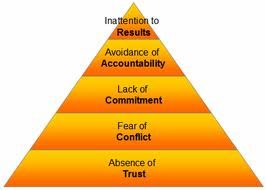You’ve certainly heard the expression that when you point your finger, four fingers are pointing back at you. It’s a reflection of how judging others reflect on us. Perhaps my favorite for this is a Dr Wayne Dyer’s offering, “When we judge others we don’t define them, we define ourselves.”
We’ve discussed how conflict is good and the fundamental attribution error previously in this blog. Communication Barrier – Fundamental Attribution Error discussed Patrick Lencioni’s Five Dysfunctions of a Team Pyramid and how the fundamental attribution error is a barrier to building trust.  Conflict is Good Strategic Discipline? And Conflicts - Encourage or Control – A Leadership Formula for Better Meetings discussed the value of conflict in your meetings based on Lencioni’s book Death By Meeting.
Conflict is Good Strategic Discipline? And Conflicts - Encourage or Control – A Leadership Formula for Better Meetings discussed the value of conflict in your meetings based on Lencioni’s book Death By Meeting.
First let’s define again what the Fundamental Attribution Error is. As explained in Patrick Lencioni’s Field Manual for Overcoming the Five Dysfunctions of a Team, the Fundamental Attribution Error is:
We human beings tend to falsely attribute the negative behavior of others to their character, while we attribute our own negative behaviors to our environment. In other words, we like to believe that we do bad things because of the situations we are in, but somehow we assume that others do bad things because they are predisposed to being bad.
In the same way, we often attribute other people’s success to their environment and our own success to our character. That’s because we like to believe that we are inherently good and talented, while others are merely luck, beneficiaries of good fortune.
As you look ahead to 2013 ask yourself how much conflict is occurs in your meetings? Specifically how much conflict do you allow with your ideas as CEO or president? If you’re of the mindset that you’re always right and that it’s your way always in your business, then most of this is already passing over your head. You’re not reading it or simply refusing to admit it. The rest of you please read on.
Remember in Creating the Discipline of The Advantage Patrick Lencioni believes the single greatest advantage any company can achieve is organizational health.
If you’re opened minded to this, realize the value of conflict and the challenge that you and your people face overcoming the Fundamental Attribution Error. It’s a major barrier to your team achieving organizational health and business success in 2013 if you don’t begin to work on it.
Vulnerability leads to trust. Until we break down the walls that separate our leadership team from seeing each other as they truly are and accept them we cannot build a foundation of trust to help us move up the Five Dysfunctions of a Team Pyramid where ultimately results arrive.
We cannot be sure of why others behave as they do. As Native Americans would say, “Great Spirit, grant that I may not criticize my neighbor until I have walked a mile in his moccasins.” Understanding others, lacking fear to conflict with them is the biggest step your team can make to help your business forge ahead. Study the Five Dysfunctions of a Team Pyramid here  and ask yourself if you and your team were to rank them in each level what would your scores be? Even if your score at the top of the pyramid is high, recognize it would be much higher if your people had the others pieces in place, starting with trust.
and ask yourself if you and your team were to rank them in each level what would your scores be? Even if your score at the top of the pyramid is high, recognize it would be much higher if your people had the others pieces in place, starting with trust.
Only when we begin to understand others behavior, their background, history and life challenges can we begin to eliminate the power that the Fundamental Attribution Error has on our thinking, behavior and inter relationships.
Strategic Discipline requires the habit of developing meeting rhythms. These meeting rhythms can provide an exceptional opportunity for the team to learn more about each other, eliminate barriers, and reduce the fear of conflict. Include in your monthly meetings a period dedicated to learning. Consider including the Five Dysfunction of a Team exercise as a fundamental tool to bring your team together and deliver more results. You’ll be surprised at how positively your people respond and excited by the growth it brings to your business.






.jpeg?width=150&height=135&name=Hand%20with%20marker%20writing%20the%20question%20Whats%20Next_%20(1).jpeg)

